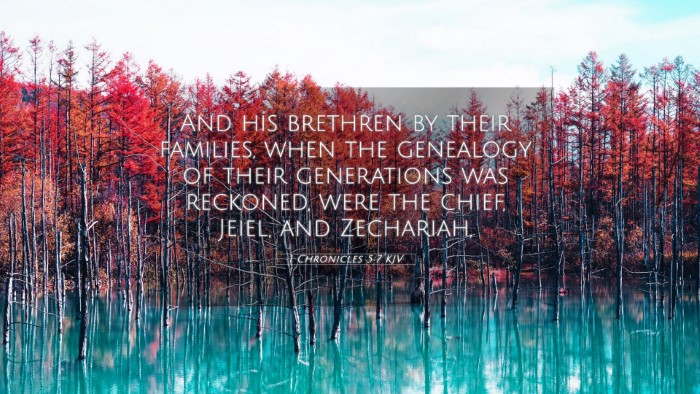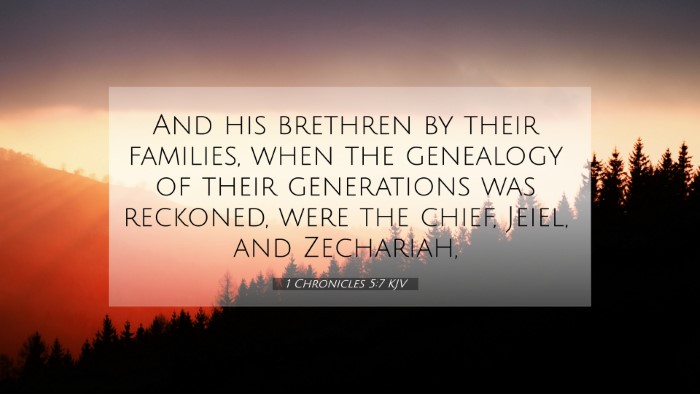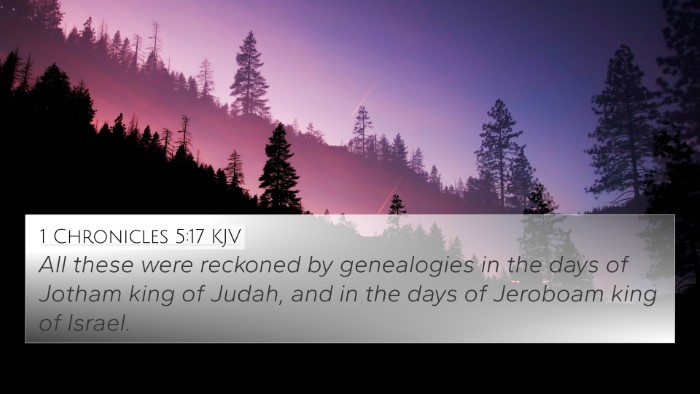Understanding 1 Chronicles 5:7
Verse Reference: 1 Chronicles 5:7 - "And his brethren by their families, when the genealogy of their generations was recorded, were the chief of the fathers of them. They dwelt in Gilead in Baashan, and in their suburbs, and in all the places of Sharon, upon their borders." (KJV)
Summary of 1 Chronicles 5:7
This verse records the lineage and territorial settlements of certain families within the Israelite tribes, particularly focusing on those descended from the sons of Reuben. The emphasis is on the significance of familial lineage and the inheritance of land, which plays a crucial role in the identity and history of the Israelites. The verse highlights their leadership and the regions they occupy, establishing both historical and genealogical importance.
Commentary Insights
Matthew Henry's Commentary
Henry emphasizes the importance of genealogy in ancient Israel, noting that it provided legitimacy and a sense of belonging among the tribes. He points out how God’s providence preserved these families, demonstrating His faithfulness to the covenant made with Abraham, Isaac, and Jacob. The lands mentioned, Gilead, Baashan, and Sharon, are significant territories that reflect the blessings of God upon these tribes, symbolizing prosperity and security.
Albert Barnes' Commentary
Barnes discusses the leadership of the families mentioned in this passage and underscores their role in both civil and military affairs. He reflects on how their position and settlement in rich pastures and strategic locations allowed them to thrive. Noting the mention of their progenitors, he explains that this verse serves to reinforce the memory of their ancestors, who were pivotal in the formation and defense of the nation of Israel.
Adam Clarke's Commentary
Clarke provides insights on the geographical context, asserting that the mentioned locations were not just mere territories but were imbued with the history and responsibilities entrusted to these families. He interprets their dwellings in Gilead and Baashan as indicative of their status and the administrative roles they held among the tribes. Additionally, he evaluates the genealogical records as a means of preserving identity among the Israelites in a rapidly changing world.
Related Bible Cross References
- 1 Chronicles 5:1-2 - Details on the lineage of Reuben and the significance of birthright.
- Genesis 49:3-4 - Jacob’s blessing on his sons, providing context for the Reubenites' heritage.
- Joshua 13:15-23 - The allotment of land to the tribes of Israel, particularly the Reubenites.
- 1 Chronicles 2:3 - Further genealogy and the implications of tribal heritage.
- Deuteronomy 3:10-11 - Description of the territories of Bashan, emphasizing their significance.
- Romans 11:1-2 - Discussion of God's faithfulness to His chosen people, reflecting the themes in Chronicles.
- Matthew 1:1-16 - New Testament genealogy showing a continuity of God's promise through generations.
Thematic Connections
The examination of 1 Chronicles 5:7 reveals great thematic connections within Scripture, particularly related to the themes of legacy, identity, and divine sovereignty. The genealogies serve as a bridge, linking the Old Testament assurances of God’s promises to the New Testament realizations in Christ. The emphasis on land and family honor within Chronicles resonates with Paul's writings, where he articulates the importance of understanding one's spiritual lineage through faith.
Conclusion
In summary, 1 Chronicles 5:7 provides insight into the heritage and living conditions of the Reubenites, demonstrating the importance of genealogy in Israel. This verse, while historical, opens the door to deeper theological discussions regarding God’s promises, faithfulness, and the importance of knowing one's place within God's unfolding narrative. Through cross-referencing with related scriptures, we can gain a fuller understanding of the text and its implications for both ancient and modern believers.



